
Dubrovnik to Ljubljana Itinerary
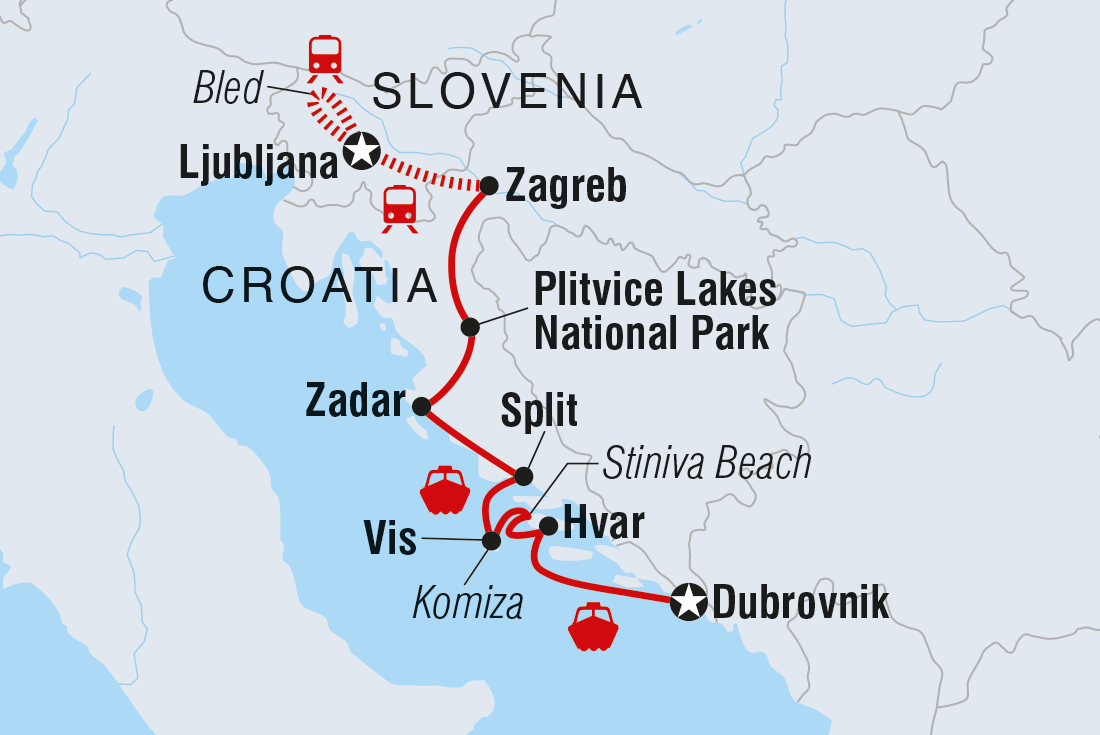


Dobro Dosli! Welcome to Croatia. Your adventure begins with a welcome meeting at 6 pm in Dubrovnik – the undisputed jewel of the Dalmatian Coast. With the sparkling water of the Adriatic in the background, this gorgeous city is full of character and can easily be covered on foot. If you arrive early, maybe head out to one of the Elafiti Islands, like Lopud – a quiet island popular for hiking, clean beaches and a ruined castle – or Kolocep – great for scenic walks for every fitness level. Tonight, maybe get to know your fellow travellers over dinner.
Beat the crowds with an early morning walk along Dubrovnik's city walls that surround the Old Town. Soak up the views of the sea from the fully intact medieval structure, then enjoy all that Dubrovnik has to offer with the remainder of the day free for you to explore. Visit Big Onofrio's Fountain – a masterpiece built by famous European architect Onofrio della Cava. Check out the Franciscan monastery with one of the world's oldest, continuously functioning pharmacies, founded in the 13th century. This afternoon, board a catamaran to Hvar. When you arrive, the rest of the evening is free for you to explore at your own pace.
This morning, join your local leader on an orientation walk through the island. Known for its beautiful beaches and vibrant nightlife, maybe explore Franciscan Monastery, visit the UNESCO World Heritage site of Stari Grad or discover Vrboska – a small town known for its fishing boats and bustling harbour. After, maybe hike to the top of Spanjola Fortress for panoramic views over the region, relax on the beach or find a local restaurant and try some local dishes like pasticada (traditional stewed beef) and some fresh grilled vegetables with olive oil, usually served with fresh goat and sheep cheeses (and maybe some smoked ham to tie it all together).
A morning boat trip takes you to the neighbouring island of Vis. In the heart of the Adriatic Sea and off the Dalmatian Coast, Vis is known for its ancient city walls and thermae (public bath). As you cruise around the island, stop at Green Cave for a swim. Then, maybe snorkel at Blue Cave before continuing to Stiniva Beach – a secluded cove with dramatic cliffs and a narrow entrance. This afternoon, return to Vis. Tonight, maybe relax on the gorgeous beaches or wander through the island’s bars and restaurants – aperitif at sunset, anyone?
This morning, set out on a military tour through Vis Island. The island used to be a military base in Yugoslavia which did not allow access to tourists. Here, you’ll visit local properties, indulge in local produce and hear historical stories of the island’s military background. Discover military facilities such as the rocket launcher base, cannon base and submarine tunnel, then sit down for a local wine and food tasting at the family property, Komiza. The rest of the afternoon is free for you to explore at your own pace. Maybe wander through the lavender fields, visit St Stephen’s Cathedral or simply unwind on the beach.
Catch a boat to Split this morning. Situated on a small peninsula on the eastern shores of the Adriatic Sea, Split is the second largest city in Croatia. When you arrive, join a local guide for a walking tour of the seaside town and get to know its history. See the original and well-preserved basements under the city, the Cathedral in Diocletian's Palace and Jupiter's Temple. Explore the impressive ruins of Diocletian's Palace – Split's most imposing structure and some of the most interesting ruins on the Adriatic coast. Portions of the Palace are over 1700 years old! After, maybe grab a drink at a cafe on the Riva Promenade and people watch for a while. Tonight, maybe get your group together for a harbourside dinner and toast to a great trip.
Take a full day to explore Split further. You might like to take a day trip to the surrounding area and visit the ancient Roman city of Salona, or the sleepy towns of Trogir or Sibenik. There will be a meeting at 6 pm to welcome any new travellers joining you on the next stage of your adventure. In the evening why not head out for some fresh seafood with your travel companions?
This morning, you'll travel by local bus northwest to Zadar. For centuries Zadar was the capital city of Dalmatia, and the city's rich heritage is visible at every step. An important coastal town, the musical steps of the ‘Sea Organ’ on Zadar's waterfront express its important relationship with the sea. Trace marble streets through the Old Town and discover Roman ruins in amongst medieval churches. Enjoy some local food and drinks in a city that’s home to a vibrant café culture. Zadarsko pivo is a light beer with a very pleasant taste, just a little bit bitter, with a rich flavour. After, maybe treat yourself to a gourmet meal at a contemporary Croatian restaurant. Try njoki (lamb in red wine) with Dalmatian ham and rocket salad, or opt for the popular choice of fresh tuna carpaccio or a fillet in scampi sauce. Also try the famous liqueur, Maraskino, made from locally-grown maraschino cherries according to a centuries' old secret recipe. This unique drink was a favourite at European imperial and royal courts and has been produced in Zadar since 1821.
Head out of the city this morning for a special experience at the farm of the Benedictines of St. Mary. This order leads a secluded life, believing that working on the agricultural land brings them closer to God. During your visit, you'll taste some of the award-winning jams, liqueurs and juices produced in the monastery. Sample high-quality olive oils and wines with cheese and bread, then take a tour of the property. As you walk around the orchards, you'll learn about how the nuns live, the fruits grown on the grounds and how their products are produced. After some time to explore, you'll head back to Zadar in the afternoon, where you'll have free time. Maybe try the famous liqueur, Maraskino, made from the locally grown maraschino cherries. This unique drink was a favourite at European royal courts and has been produced in Zadar since 1821.
Travel inland this morning to your next base in Grabovac and visit Plitvice Lakes National Park – an Eden of waterfalls and lakes. Fed by the Bijela and Crna Rivers, the waters tumble from tree-lined ridges through dense forests. Sixteen lakes fed by underground springs are split into the upper and lower lakes. The upper are in the dolomite cliffs, where water weaves in and out of the karst, dropping dramatically down to the lower lakes. This interplay of water, rock and plant life creates a dynamic landscape. Look out for over 120 species of birds, including hawks and owls, and butterflies that transform the park into a riot of colour. After, visit Licko Petrovo Selo – a small village next to the park with a local NGO that focuses on preserving the historical art of woolly men's underwear. Take a short tour of the NGO and hear about how they preserve this important part of their cultural heritage (and maybe even buy a warm souvenir to take home).
Continue to Croatia’s capital and largest city – Zagreb. Full of parks and squares, Zagreb is a laidback place, proud of its coffee culture and the perfect spot to wander. Follow your leader on an orientation walk when you arrive and then enjoy some free time for the rest of your time here. Maybe join one of the many free walking tours in the city and engage with a local here to learn about their daily life or browse the city’s stunning neo-baroque and gothic architecture. You could check out Tkalciceva Street’s lively social scene or head up Medvednica Mountain, where the views stretch as far as neighboring Slovenia on a clear day. To live like a local, maybe head to Zagreb’s open-air markets where you’ll find all kinds of fresh vegetables, nuts, honey and liqueurs.
This morning, take the train and cross the border to Ljubljana. One of the smallest capitals in Europe, Ljubljana makes up for it by also being one of the greenest and most vibrant cities on the continent. Follow your leader on an orientation walk and ride the funicular up to Ljubljana Castle for panoramic views of the city. Dubbed the ‘dragon city’ due its ties to Greek mythology, you’ll likely spot dragon symbols scattered about. Ljubljana, home to 50,000 students, is known for its lively nightlife. Explore Metalkova for an alternative vibe or the Old Town for its historical charm – or ask your leader for their recommendations.
Embark on a day trip to Lake Bled this morning. Your leader will guide you on a scenic walk that passes some impressive 19th century villas, including the residence of the former Yogoslav president ‘Marshal’ Tito – now known as the hotel Vila Bled. The rest of the day is free for you to explore all that Bled has to offer. If you’re feeling active, consider renting a paddleboard and taking a trip around the picturesque island. Alternatively, you can get on a Plenta boat ride – a wooden, awning-covered boat rowed by a special oarsman – and reach it that way. From there, climb the 99 steps to St Mary’s Church and ring the wishing bell. Be sure to seek out the famous Bled cream cake, which isn’t hard – nearly every cafe and cake shop in town claims theirs is the best. Return to Ljubljana in the evening and perhaps round your group together for a final dinner.
There are no activities planned for the final day and you can depart your accommodation at any time. For those who wish to stay in Ljubljana, reach out to your booking agent ahead of time to organise additional accommodation.

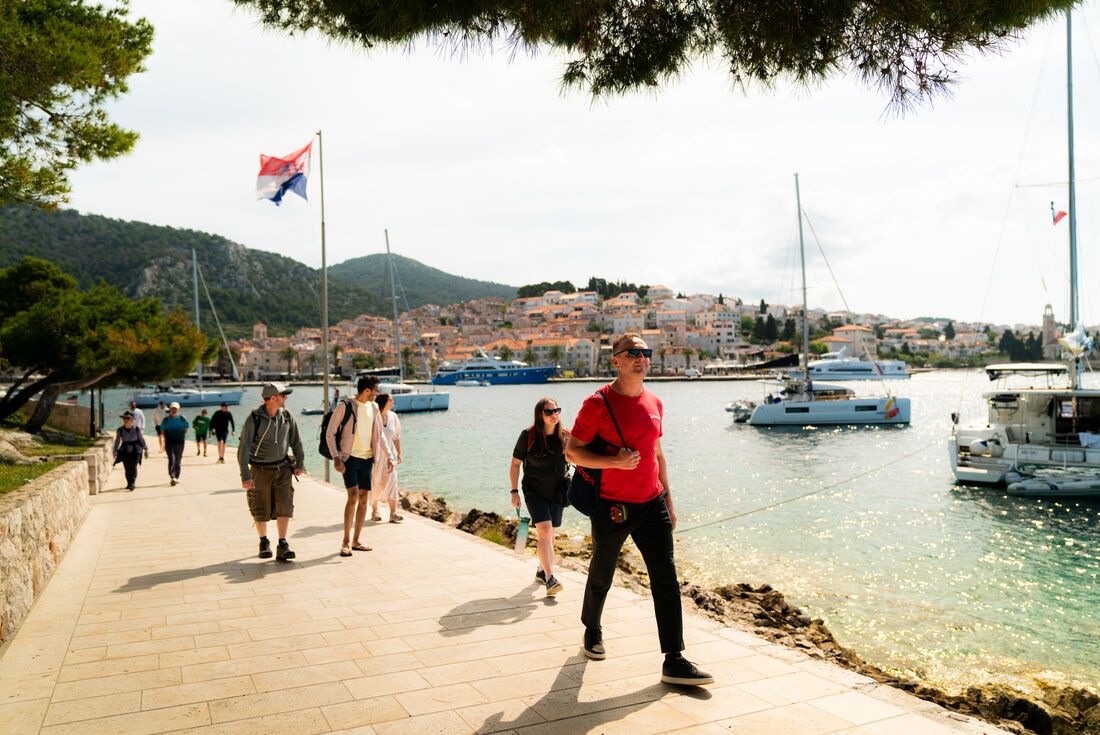
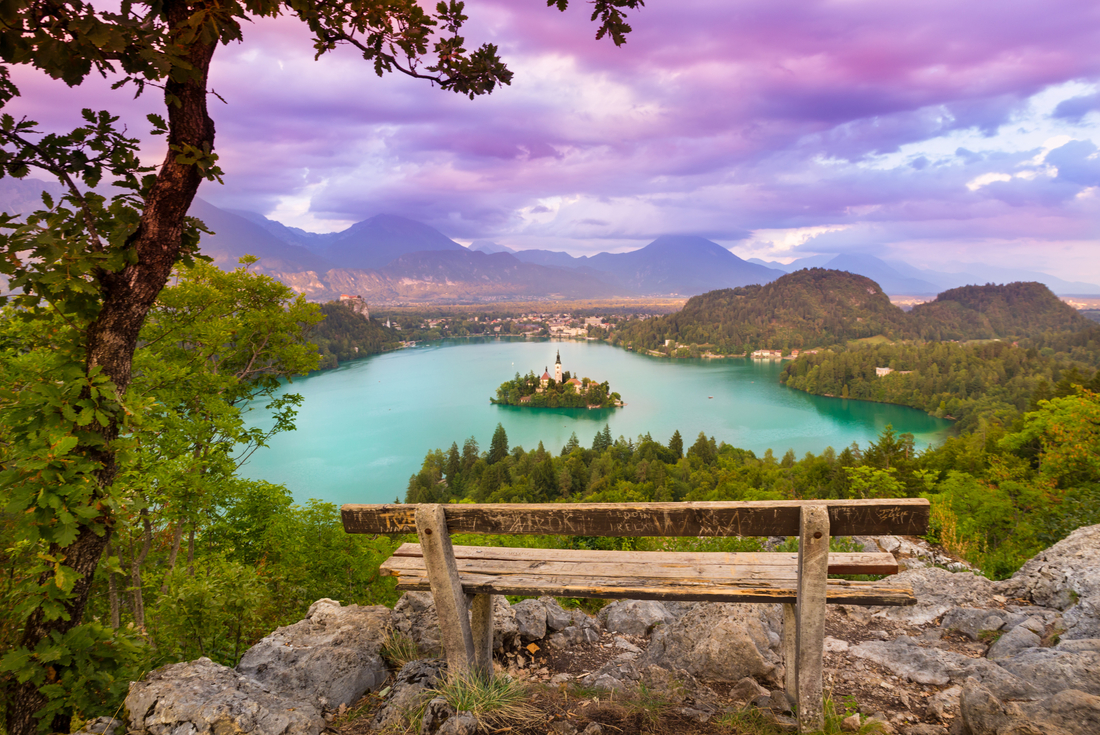
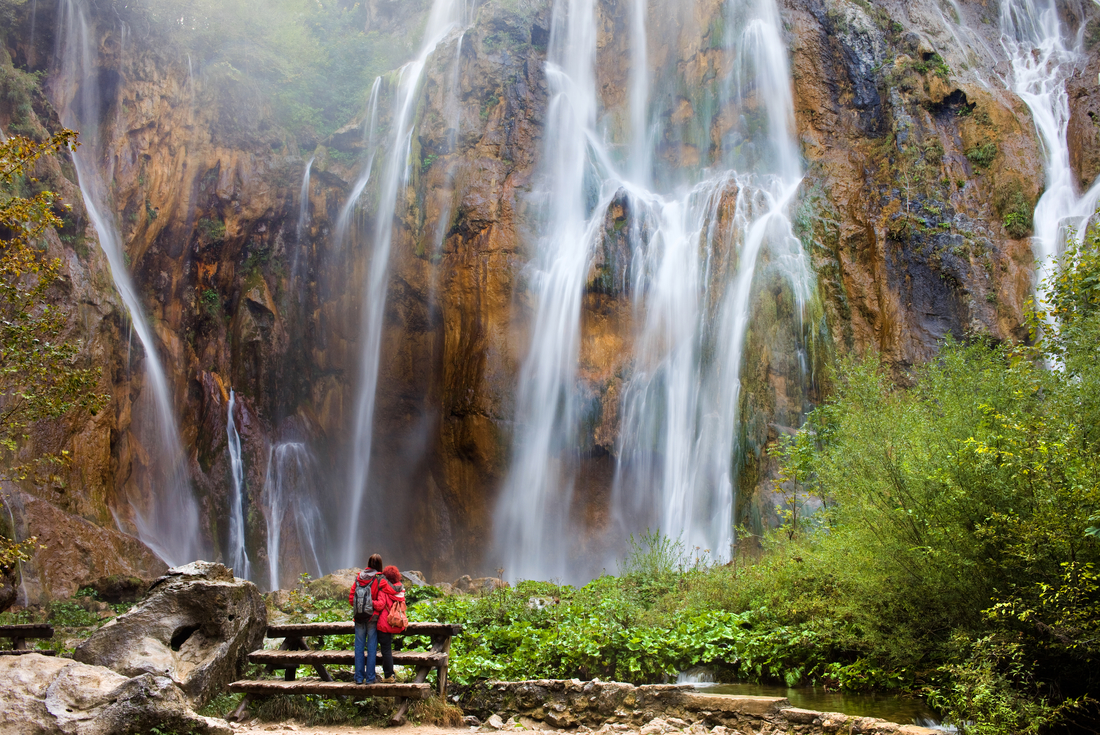
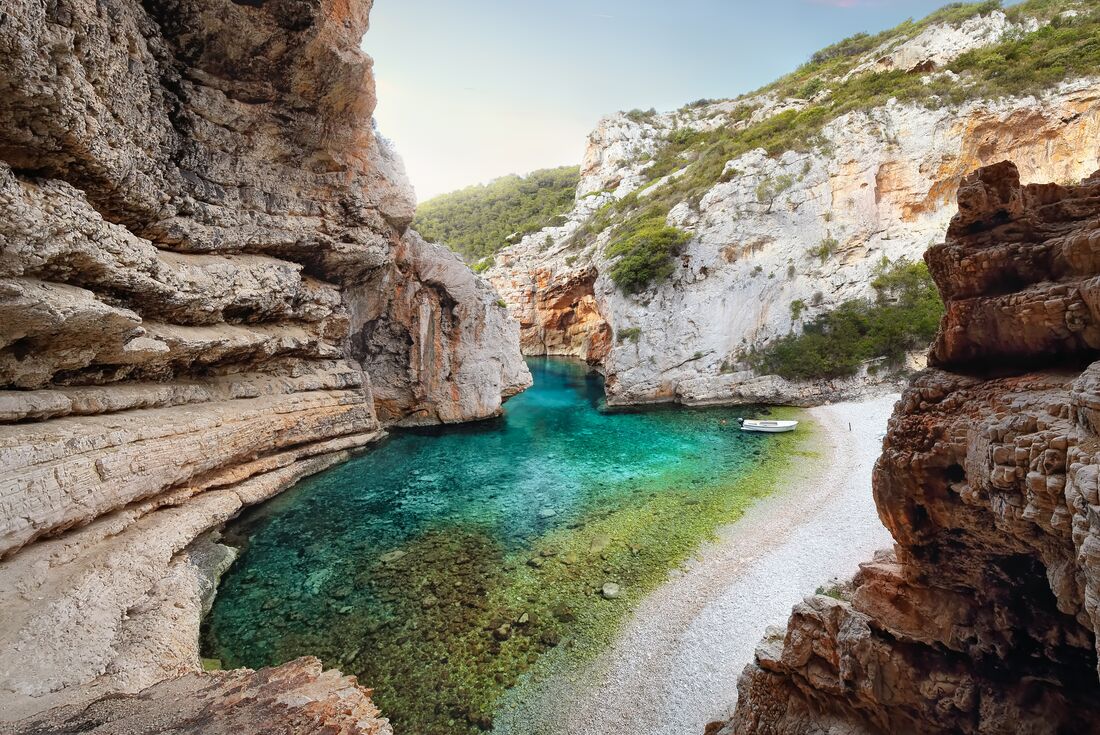
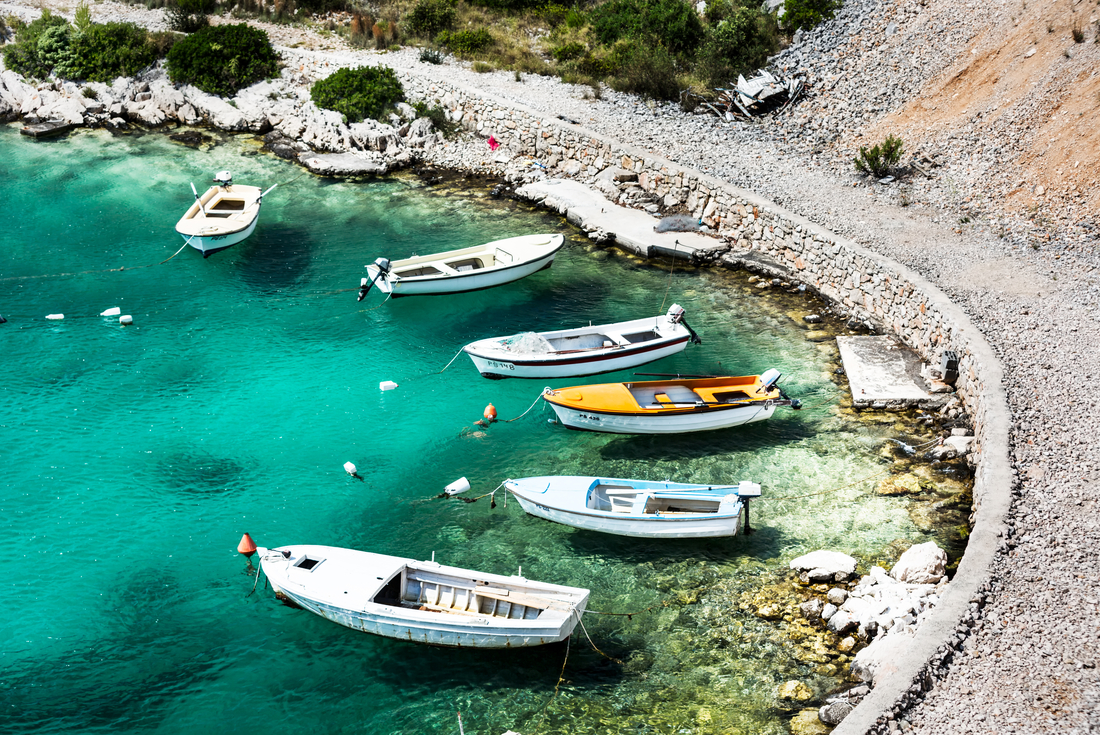
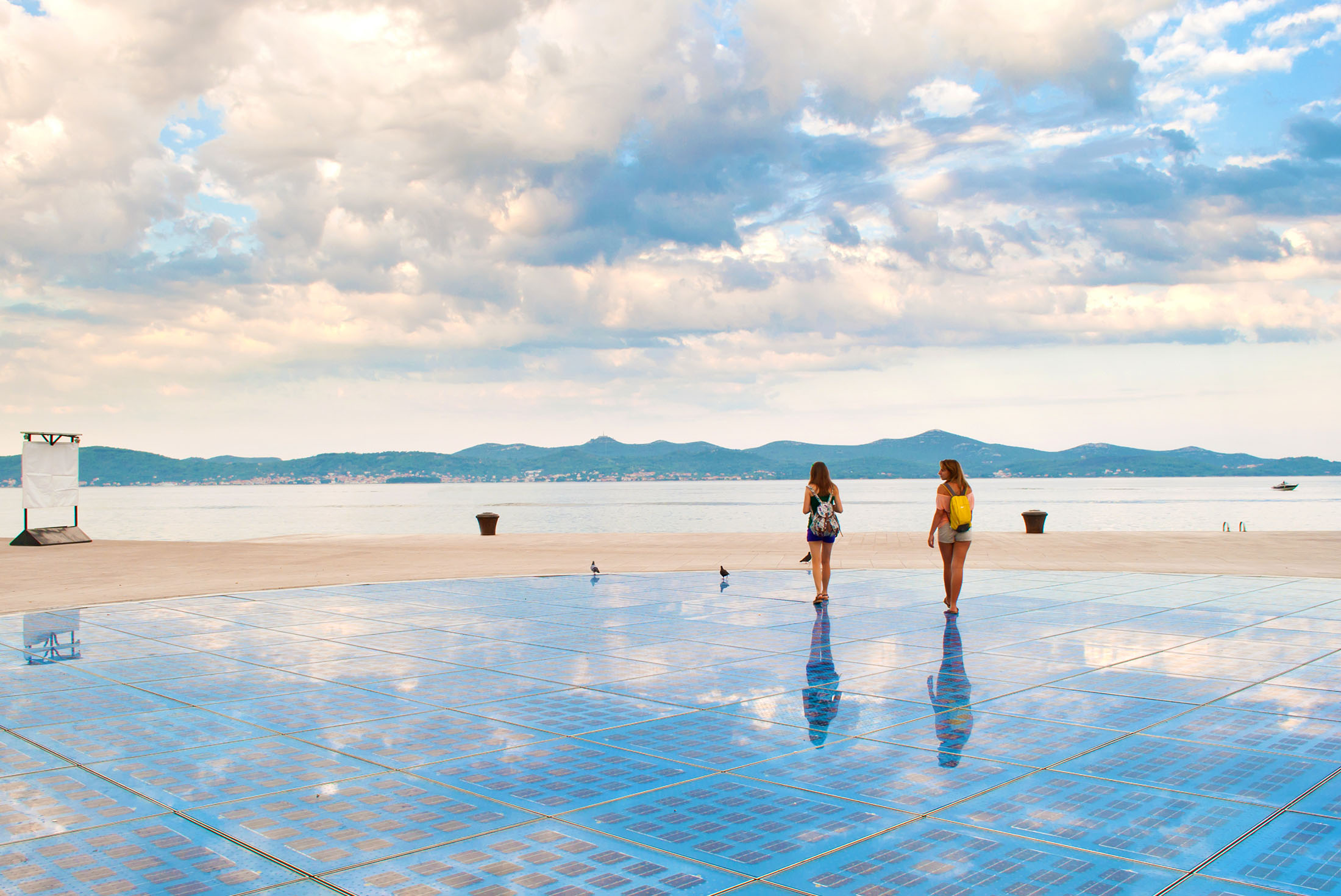
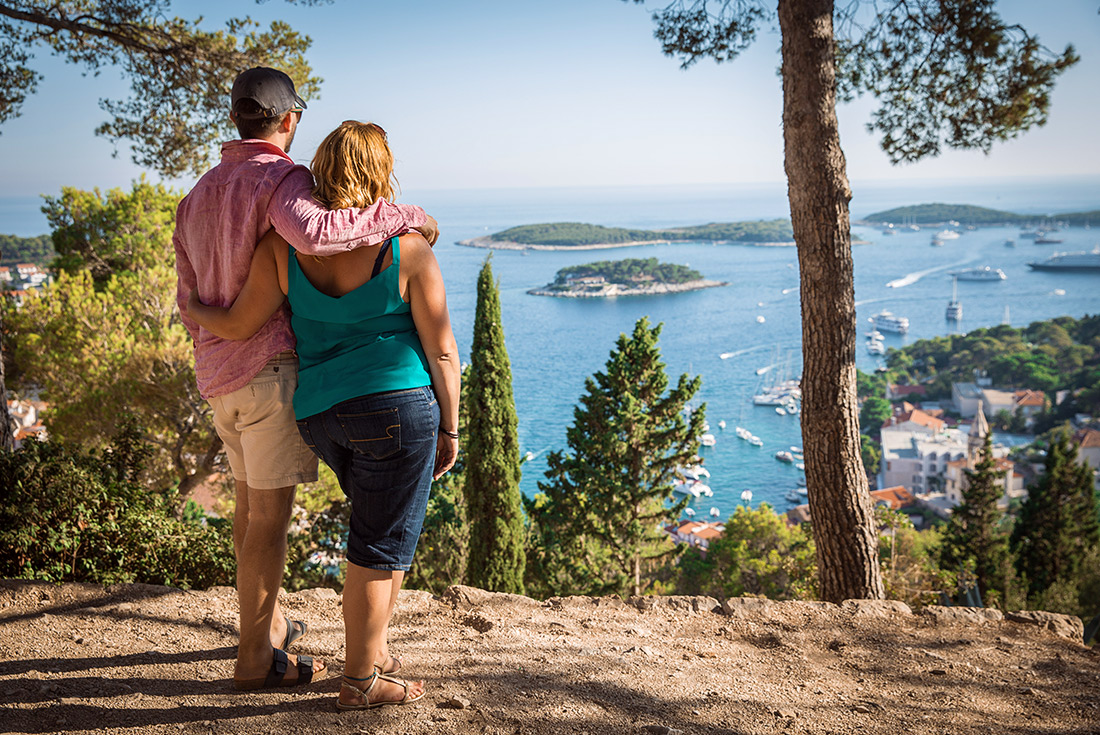
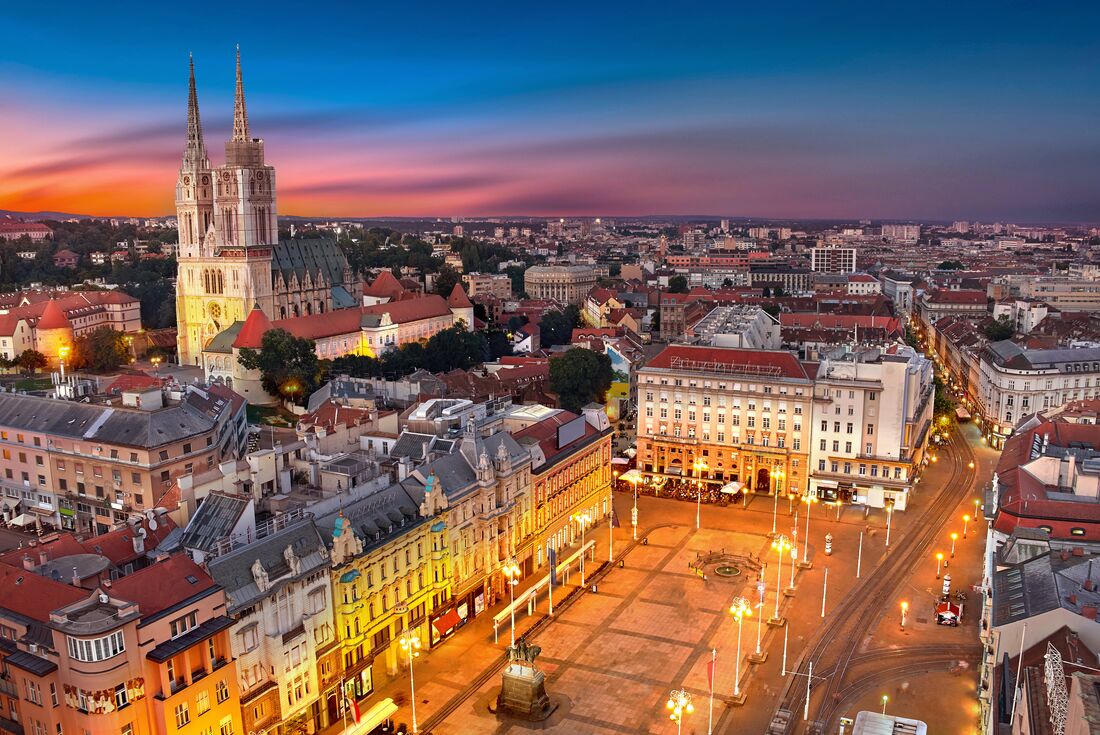
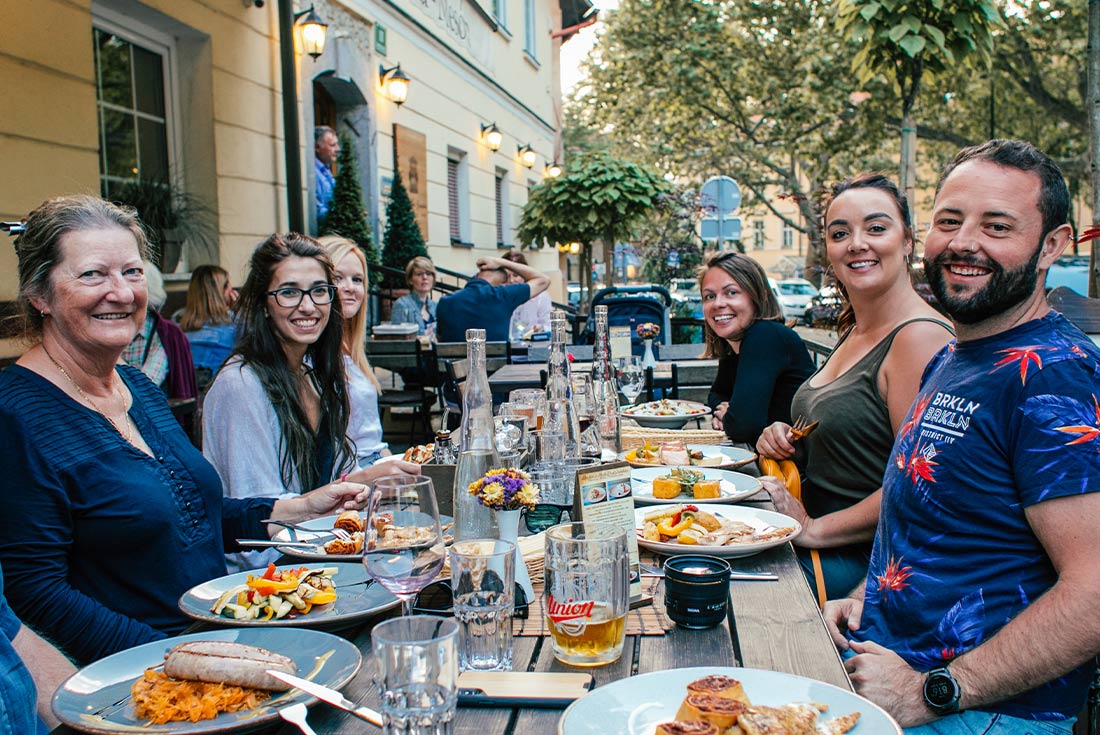
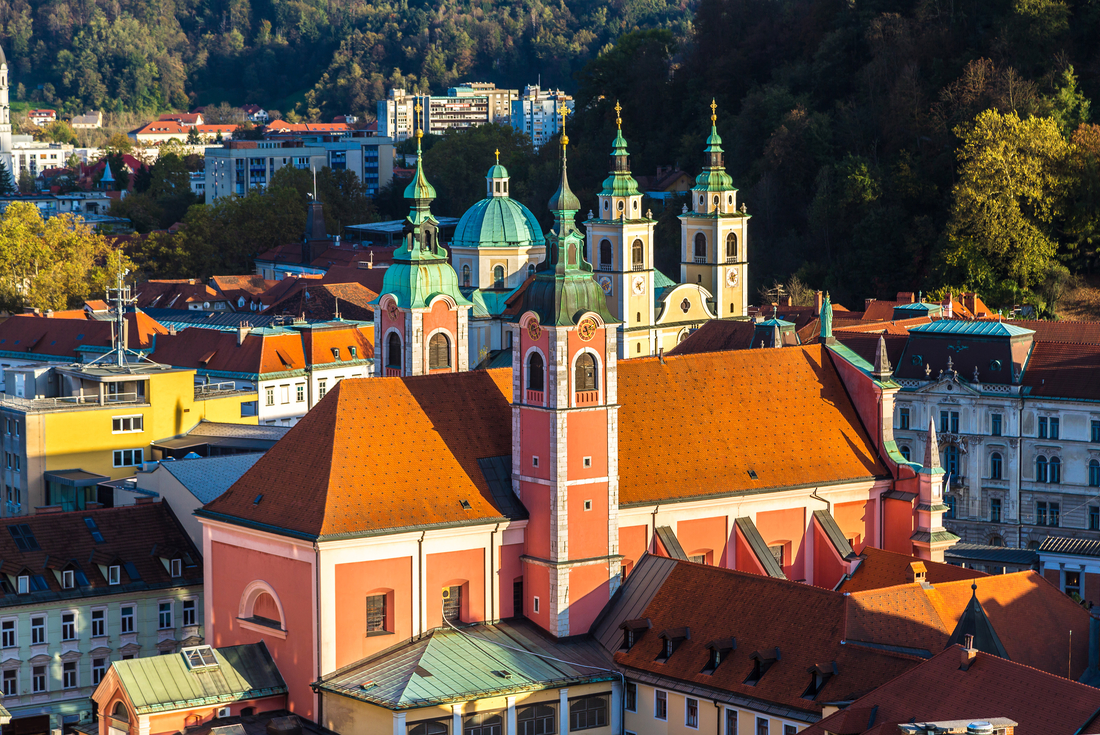
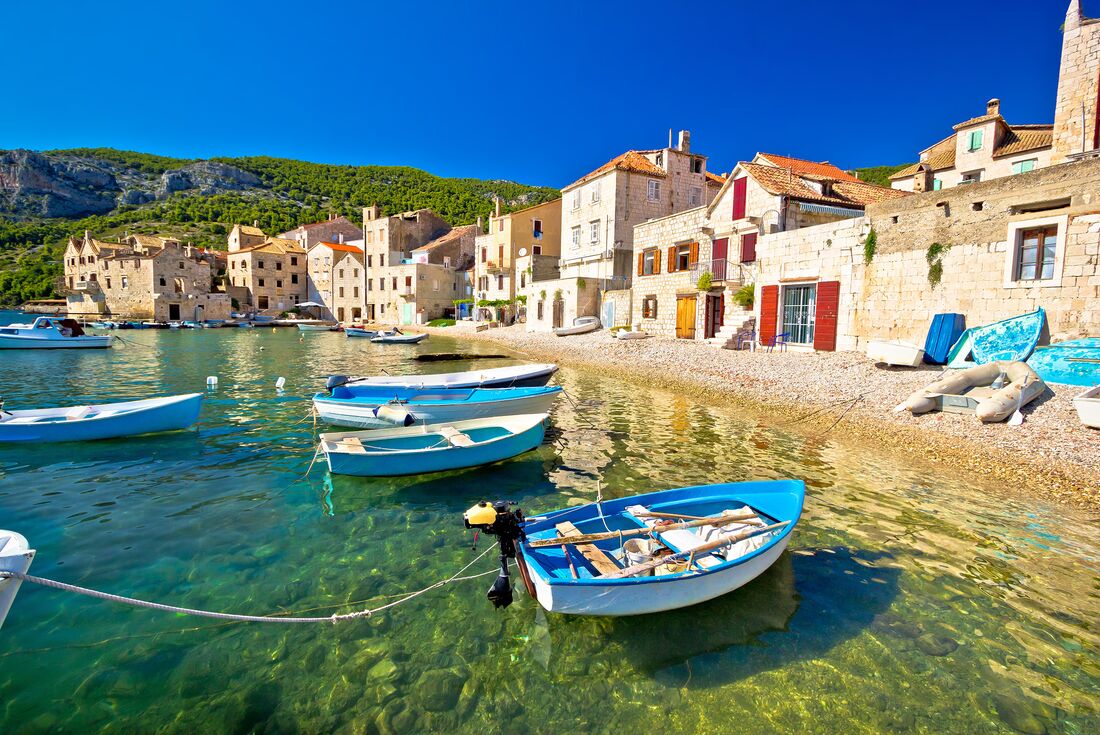
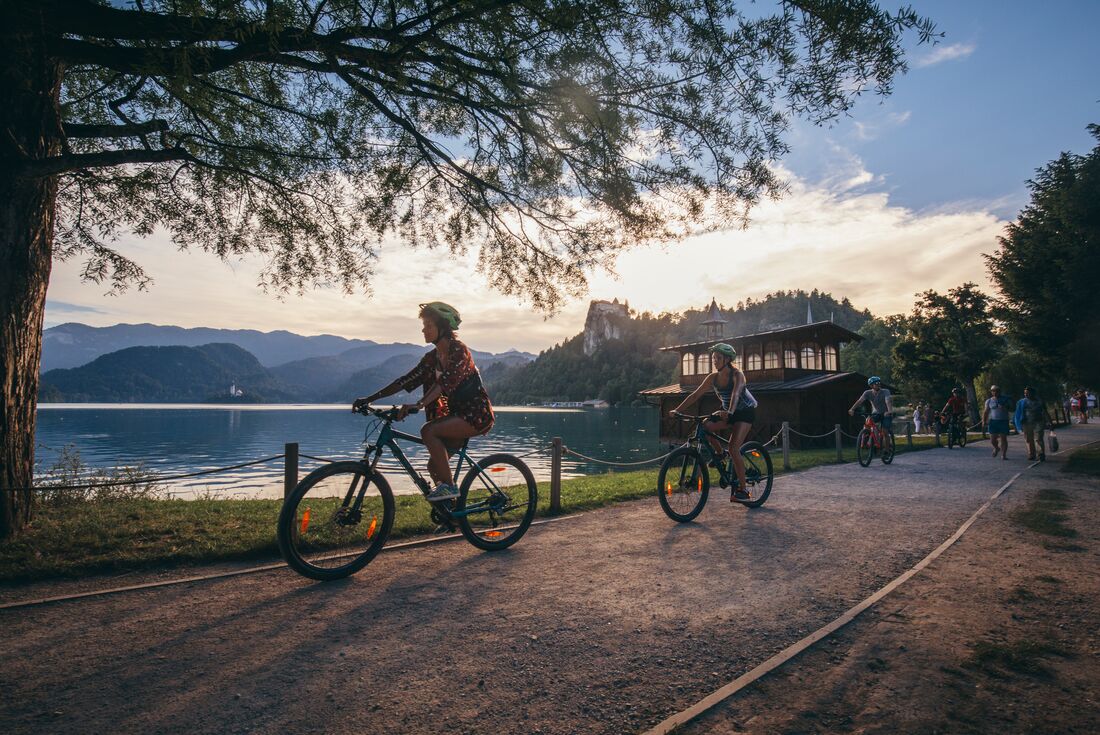
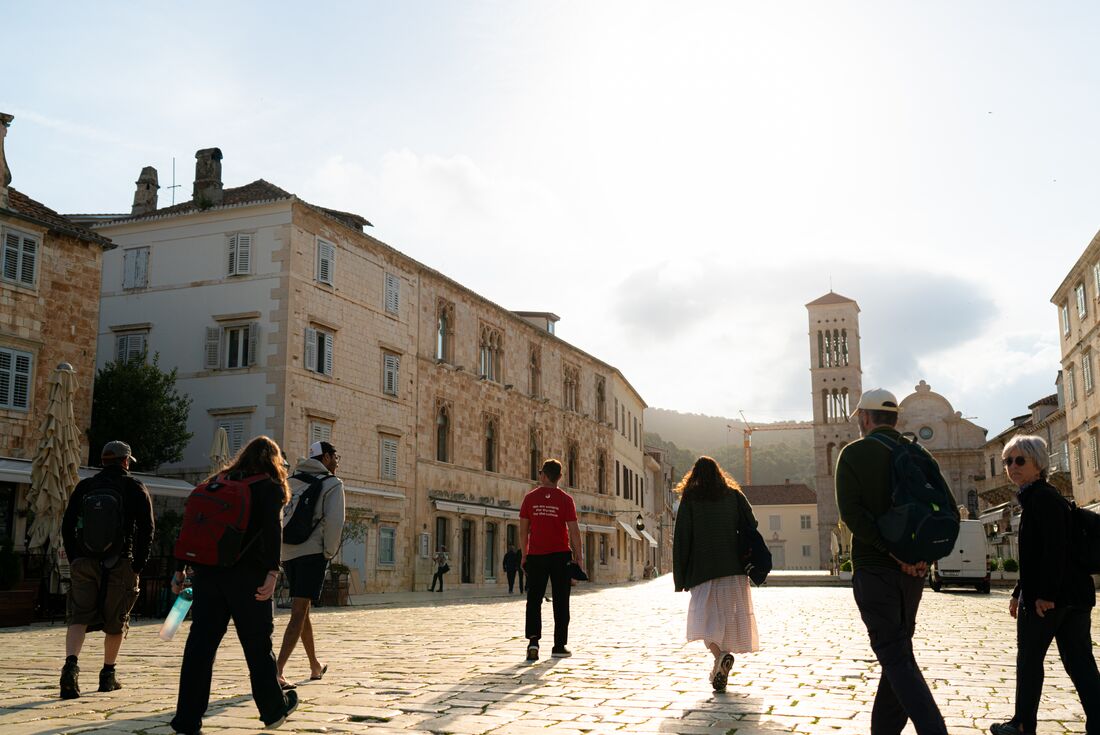
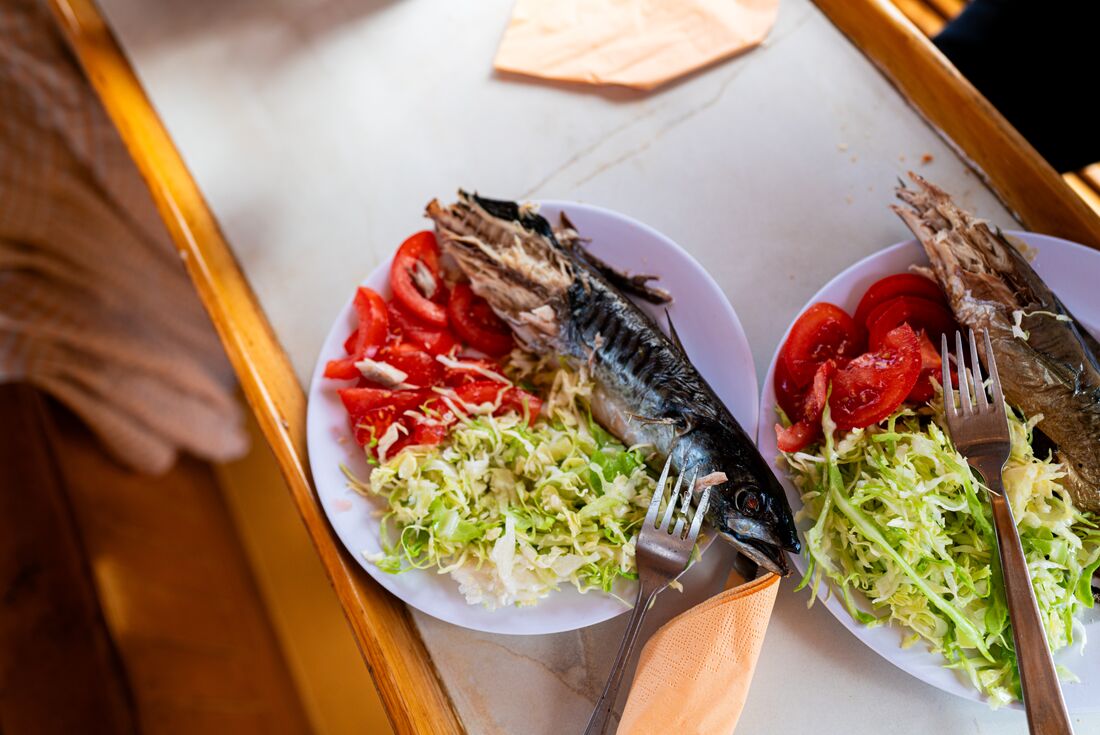
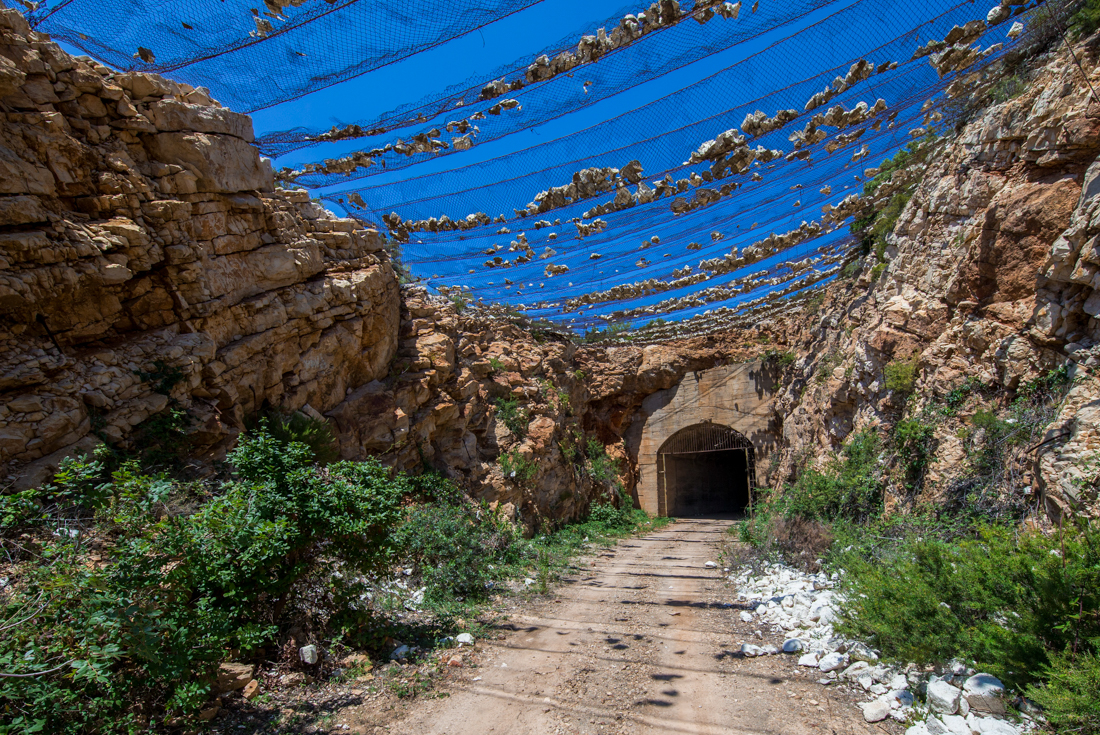
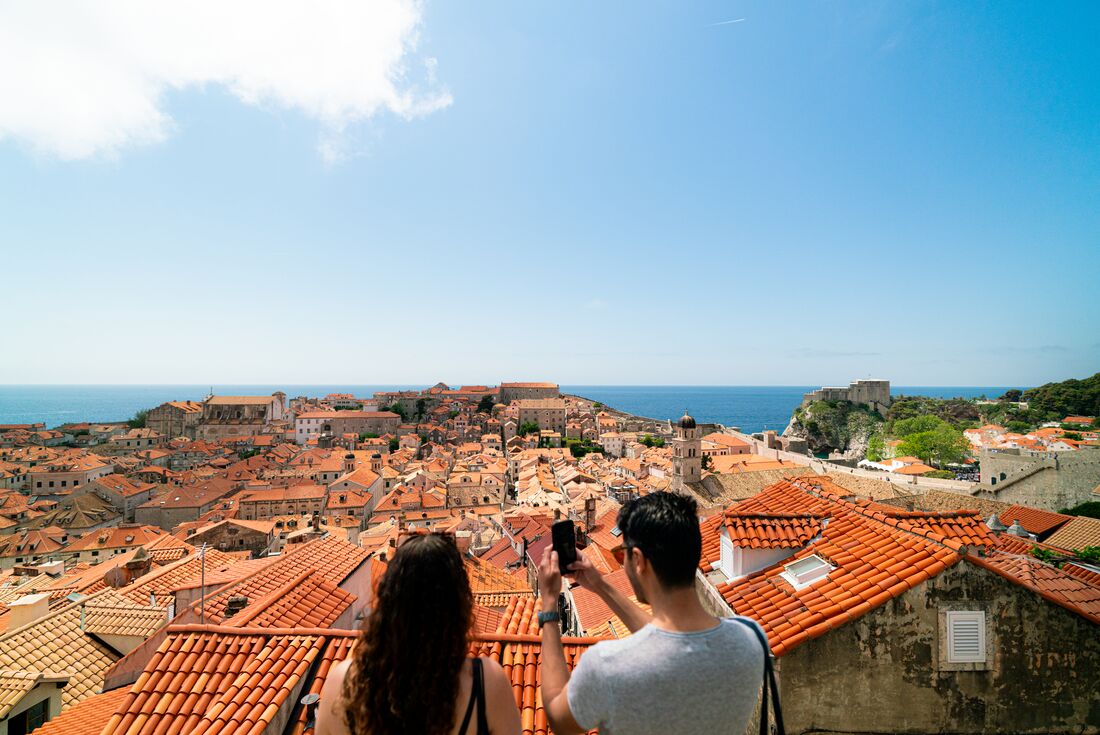
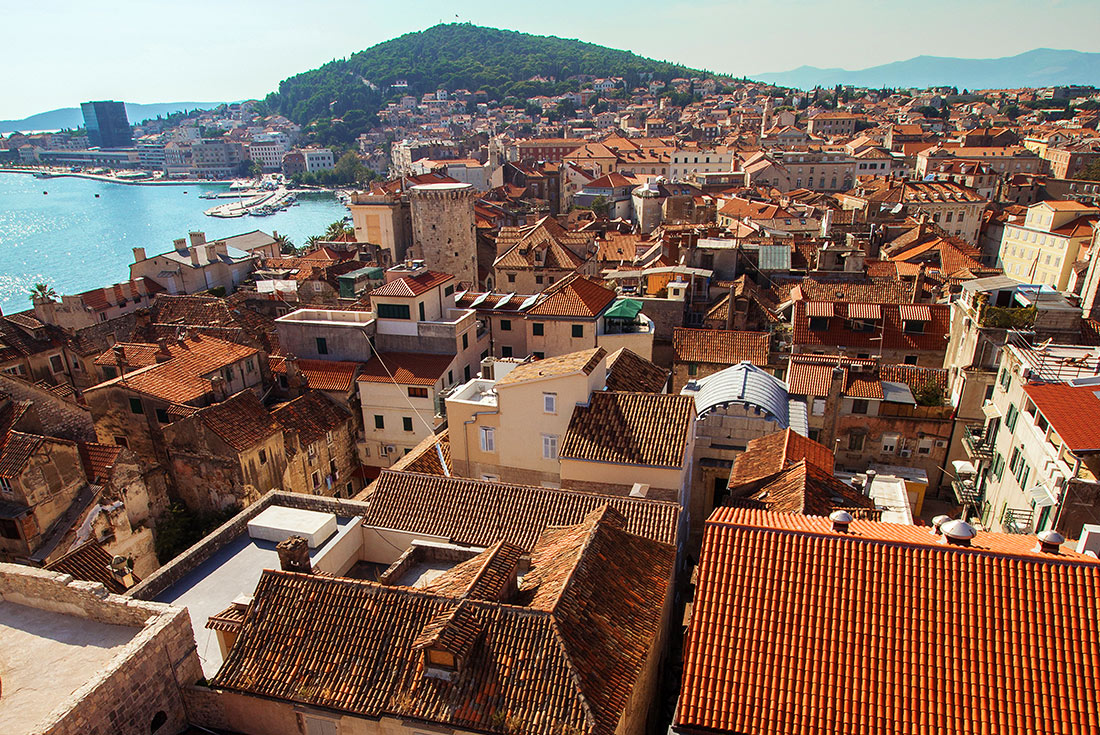
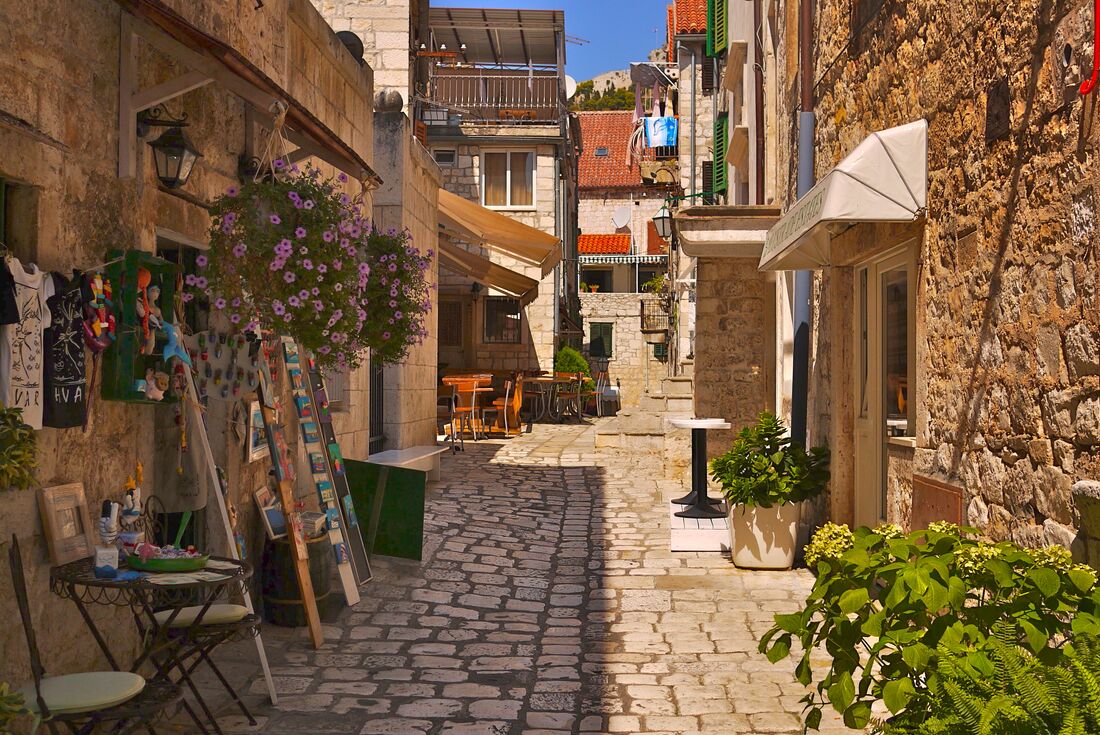
Dubrovnik - Welcome Meeting
Dubrovnik - City Walls Walk
Dubrovnik - City card
Hvar - Atmospheric dinner at secluded bay
Hvar - Orientation walk
Vis - Hvar to Vis Boat Trip
Vis - Stiniva Beach visit
Vis - Blue Cave visit
Vis - Green Cave visit
Vis - Military & History Tour of the island
Vis - Local produce degustation
Vis - Komiza coastal town visit
Split - Guided City Tour
Zadar - Leader-led orientation walk
Zadar - Nunnery & farm visit
Plitvice Lakes - National Park Visit
Licko Petrovo Selo NGO visit
Zagreb - Leader-led Orientation Walk
Ljubljana - Castle and Funicular
Ljubljana - Leader-led walking tour
Bled - Walk around Lake Bled
Bled - Day Trip
Explore the green island of Mljet – with its small seaside villages, national park trails, shimmering waters and largely untouched environment, you might never want to leave!
Snack on salty cheese made from sheep’s milk during a trip to the karst island of Pag, where a determined group of islanders wring themselves a living from the barren, rocky landscape.
Join a guided tour of the 4th-century Diocletian’s Palace in Split, which reveals not just the Roman-era beauty, but also the local businesses in the alleyways and cellars of this epic structure.
Gaze over the beautiful hillside, lavender fields and vineyards of Hvar Island during a leisurely organic dinner at an agriturismo.
Stroll through Plitvice Lakes National Park and see the luminous lakes and waterfalls that seem to have been sketched by an artist.
Hostel Sol, Obala Ivana Pavla II 13 , Dubrovnik, CROATIA, Phone: +385 20610300
Hotel Emonec, Wolfova Ulica 12 , Ljubljana, SLOVENIA, Phone: +386 12001520
1. A single supplement is bookable on this trip. Availability is limited due to small properties we use. Please speak to your booking agent for further information.
2. As this is a combination of 2 trips, your leader and the composition of your group may change in Split.
While we always endeavour to provide the best possible holiday experience, due to the nature of travel and the areas we visit sometimes things can and do go wrong. Should any issue occur while you are on your trip, it is imperative that you discuss this with your group leader or local representative straight away so that they can do their best to rectify the problem and save any potential negative impact on the rest of your trip.
We recognise that there may be times when your group leader or local representative may not be able to resolve a situation to your satisfaction - if this is the case, please ask the group leader or local representative to speak to their direct manager.
You may also choose to provide details in your online feedback, which we ask you to complete within 30 days of the end of your trip. Please do be aware that it is very difficult for us to provide any practical help after the trip is completed, so informing us while still travelling will give us the opportunity to resolve the issue in real-time., For general contact details please use the following page: https://www.intrepidtravel.com/contact-us, If you have booked an arrival transfer, and you experience severe delays at immigration, baggage collection or customs, or if you are not able to find to the driver, please contact the transfer operator directly on the number listed in the joining point instructions in the section above., In case of a genuine crisis or emergency, you can reach our local office on the numbers below:
, Intrepid's Local Operator: +49 8024 4679 540
The Croatian coast is ruggedly beautiful and mountainous. This makes for a gorgeous backdrop, but it also means plenty of steep steps. You will have to be able to easily lift your luggage and carry it up and down stairs and inclines. Also, stone streets become very slippery when wet. Some people may find Croatia's topography very demanding., Don’t let the heat keep you from exploring the world! Summer temperatures can be very high in this region (over 40°C), which can make things uncomfortable. It’s important to use sun protection, wear layers to combat the heat, and drink plenty of water., Hotels in Europe often don't have double beds, but rather two single beds that can be pushed together. In some cases, bathroom facilities will be shared rather than ensuite., Live like a local! Please note that on Hvar and in Bled we stay in private apartments that locals rent out during summer. These are located in various buildings spread across town, but all are well located. The apartments are not hotels, which means there's no reception desk, room service or daily cleaning service, no televisions or washing machines. They differ in layout and facilities, can vary in size and most don't have air-conditioning and Wi-Fi. While multi-share rooms are assigned only to folks of the same gender, apartments are allocated on a mixed gender basis. Apartments may only have one bathroom which will be shared between the group members staying in the same apartment. If you have paid a single supplement, you will be allocated your own room, however this room will be in a shared apartment with shared bathroom facilities, not a single or studio apartment., On this trip you must pack as lightly as possible because you will be expected to carry your own bag and although you won't be required to walk long distances with your luggage (max 30 minutes), we strongly recommend keeping the weight under 15 kg. Most travellers carry their luggage in a backpack, although an overnight bag with a shoulder strap would suffice if you travel lightly. Smaller bags or backpacks with wheels are convenient although we recommend your bag has carry straps to accommodate the cobbled streets, uneven surfaces, stairs and steps you are likely to encounter while carrying your luggage. You'll also need a day pack/bag to carry water and a camera etc for day trips.
Explore the green island of Mljet – with its small seaside villages, national park trails, shimmering waters and largely untouched environment, you might never want to leave!, Snack on salty cheese made from sheep’s milk during a trip to the karst island of Pag, where a determined group of islanders wring themselves a living from the barren, rocky landscape., Join a guided tour of the 4th-century Diocletian’s Palace in Split, which reveals not just the Roman-era beauty, but also the local businesses in the alleyways and cellars of this epic structure., Gaze over the beautiful hillside, lavender fields and vineyards of Hvar Island during a leisurely organic dinner at an agriturismo., Stroll through Plitvice Lakes National Park and see the luminous lakes and waterfalls that seem to have been sketched by an artist.
All Intrepid group trips in Europe are accompanied by one of our local European group leaders. ’Local’ in this context means a leader who is European or lives in Europe. The aim of the group leader is to take the hassle out of your travels and to help you have the best trip possible. Intrepid endeavours to provide the services of an experienced leader however, due to the seasonality of travel, rare situations may arise where your leader is new to a particular region or training other group leaders. Your leader takes care of logistics, will provide information on the places you are travelling through, offer suggestions for things to do and see, recommend great local eating venues and introduce you to our local friends. While not being guides in the traditional sense you can expect them to have a broad general knowledge of the places visited on the trip, including historical, cultural, religious and social aspects.
At Intrepid we also aim to support local guides in the individual cities or locations we travel to. If you are interested in delving deeper into the local culture at a specific site or location then your leader can recommend an optional local guide service in most of the main destinations of your trip.
TRAVEL ADVISORIES & ALERTS
We recommend that you check your government's foreign travel advisory for the latest information about the destination before you travel. You will also need to ensure that your travel insurance covers you for all destinations and activities on your trip. We also recommend saving the phone number for emergency consular assistance for your government’s consulate in the destination/s you’ll be travelling. Links to travel advisories and any current travel alerts for our trips can be found here: https://www.intrepidtravel.com/travel-alerts
PERSONAL SAFETY
Ensure you have a secure method of carrying your passport, phone, credit cards and cash while travelling such as a money belt. Leave all other high value items, including jewellery, at home Use safety deposit boxes at hotels to store your valuables when available and ensure your luggage is lockable. Be aware of the risk of pick-pocketing and petty theft. Exercise caution when walking at night, don’t walk alone and stick to well-lit streets wherever possible. Be vigilant on public transport and look out for your fellow travellers. Take precautions such as carrying your bag in front of you and never leaving personal items unattended.
LGBTQIA+ TRAVELLERS
Intrepid welcomes all LGBTQIA+ customers on our trips, however we operate in parts of the world that are less accepting. We support LGBTQIA+ customers to travel to these destinations and are committed to ensuring they face no discrimination on any part of the trip we control. We recommend you visit Equaldex (https://www.equaldex.com/) and your government's foreign travel advice for LGBTQIA+ travellers when choosing your trip., https://www.intrepidtravel.com/safety-guidelines, PETTY THEFT AND PERSONAL SAFETY
While travelling there is always the risk of pick-pocketing and petty theft, particularly in the more touristy cities. We recommend that you exercise caution when walking alone at night and encourage you to walk together and only on main, well-lit thoroughfares. Be particularly vigilant on public transport. Simple measures like carrying your day pack on your front, not hanging your bag over the back of your chair or on the floor and wearing a money belt will reduce any chance that your valuables should go missing., TAXIS AND RIDESHARE
We recommend using rideshare apps like Uber or Bolt, where available. They provide clear pricing and make communication easier. Please speak to your leader about using taxis in locations where rideshare options aren't available.
SCAMS
Common scams operating in Europe include ploys to get you fined on the metro without a validated ticket. Ensure that you always have your ticket stamped. Another common scam is for children to distract you with a map or a newspaper and will then steal your valuables. You may also come across shell games on the street, where players engage you in a bet, which you will lose., FIRE PRECAUTIONS
Local laws governing tourism facilities in this region may differ from those in your home country and accommodation we use may not have a fire exit, fire extinguishers or smoke alarms., SEAT BELTS:
Please be aware that local laws governing transportation safety may differ from those in your home country and not all the transport which we use is able to provide seat belts., BIKE HELMETS:
Please note that helmets are not always provided for sightseeing on bicycles.
PASSPORT
You’ll need a valid passport to travel internationally and most countries require your passport to have a minimum of 6 months validity, so remember to check the expiry date.
We need your passport information to get everything ready for your trip so it’s important that the information on your booking matches your passport exactly. Please take care to provide the correct details. We recommend carrying a copy of the photo page of your passport while travelling and leaving a copy at home with family or friends.
VISAS & ENTRY REQUIREMENTS
Many countries require a visa and obtaining the correct visa for your trip and any countries you may transit through is your responsibility. We recommend you check your visa requirements as soon as you have booked your trip. This will ensure you have time to prepare your documents and for your visa application to be processed. You can check the entry requirements for your nationality on your government's foreign travel advisories, consular websites or on our page here: www.intrepidtravel.com/visa-entry-requirements
Information not available.
Validity: 01 Jan 2026 to 31 Dec 2026
GENERAL HEALTH
All travellers need to be in good physical health in order to participate fully on this trip. For the safety and wellbeing of yourself and others, if you are unwell prior to travelling, please stay at home and contact us to make alternative arrangements.
When selecting your trip please make sure you have read through the itinerary carefully and assess your ability to manage and enjoy our style of travel. Please note that if in the assessment of our group leader or local representative a traveller is unable to complete the itinerary without undue risk to themselves and/or the rest of the group, we reserve the right to exclude them from all or part of a trip without refund.
You should consult your doctor for up-to-date medical travel information or for any necessary vaccinations before departure. We recommend that you carry a first aid kit as well as any personal medical requirements in their original packaging as they may not easily be obtained while travelling. If you are carrying medication, ensure you check your government's foreign travel advice for any local restrictions or requirements.
While travelling with us you'll experience the vast array of wonderful food available in the world. Your group leader or local representative will be able to suggest restaurants to try during your trip. To give you the maximum flexibility in deciding where, what and with whom to eat, generally not all meals are included in the trip price. This also gives you more budgeting flexibility. As a rule, our groups tend to eat together to enable you to taste a larger variety of dishes and enjoy each other's company. If you have dietary requirements and/or food allergies, please let your booking agent know prior to departure., BREAKFASTS
There are some continental breakfasts included on this trip which may simply include bread/toast or pastries, butter, jam, coffee/tea/juice (or similar)., VEGETARIANS
Vegetarians might find the menu selection in Europe less varied than they would see at home. Vegetarianism is not as common in this region and generally the choices are basic, involving vegetables, soups, salads, bread, cheese, fruit, yoghurt, eggs etc. Vegans and those on gluten-free diets may find this region very challenging and may need to supplement meals with their own supplies from supermarkets and markets. Wherever possible we will cater for dietary needs for any included meals, but there may be times when those with special requirements may need to provide their own.
SPENDING MONEY
When it comes to spending money on the trip, every traveller is a little different. You know your spending habits better than we do, so please budget an appropriate amount for things like optional meals, drinks, shopping, optional activities, and laundry. Make sure you have read the itinerary and inclusions thoroughly so you know what is included in the trip price and what you may need to pay for while travelling. , EUROPE
The Euro (EUR) is the official currency in the following destinations: Andorra, Austria, Belgium, Croatia, Cyprus, Estonia, Finland, France, Germany, Greece, Ireland, Italy, Kosovo, Latvia, Lithuania, Luxembourg, Malta, Montenegro, the Netherlands, Portugal, Slovakia, Slovenia, Spain. All other European countries still have their own national currencies.
You can use your credit/debit card in ATMs, which are common throughout Europe. You can obtain EUR cash prior to arriving through normal outlets such as banks and currency exchange offices., BUDGET
Please budget for additional meals and expenses while on your trip. We suggest EUR 675.00 for meals not included on this trip. Our suggestion is based on past traveller feedback but you may choose to spend more or less., TIPPING
Tipping can be an appropriate way to recognise great service when travelling. While it may not be customary in your home country, it is an entrenched feature of the tourism industry across many of our destinations and is greatly appreciated by the people who take care of you during your travels. It is always best to avoid tipping with coins, very small denomination notes, or dirty and ripped notes, as this can be regarded as an insult rather than the goodwill gesture it is intended to be., We recommend budgeting approximately EUR 10-20 per person per week to tip local service providers for activities included in this trip, in local currencies. This doesn’t include a tip for your leader., YOUR GROUP LEADER OR LOCAL REPRESENTATIVE
Tipping your group leader or local representative is highly appreciated if you feel they’ve provided outstanding services throughout your trip. The amount is entirely a personal preference; however, as a guideline, the recommended amount is 4-7 USD or EUR per traveller per day (in a currency relevant to your destination). Of course, you are free to tip more or less as you see fit, depending on your perception of service quality and the length and involvement of your group leader or local representative on your trip., CONTINGENCY FUNDS
We try to plan for every eventuality, but there are still some things beyond our control. We reserve the right to change an itinerary after departure due to local circumstances or a Force Majeure Event. In such emergency circumstances, the additional cost of any necessary itinerary alterations will be covered by you. Please note we are not responsible for any incidental expenses that may be incurred as a result of the change of itineraries including but not limited to visas, vaccinations or non-refundable flights. Make sure you have access to an extra US$500 for emergencies (e.g. severe weather, natural disasters, civil unrest) or other events that result in unavoidable changes to the itinerary (e.g. transport strikes or cancellations, airport closures). Sometimes these things necessitate last-minute changes to enable our trips to continue to run, and as a result, there may be some extra costs involved. The recommended amount is listed in USD for the relatability of universal travellers, however, local currency may be needed once in the country to cover these costs.
Most travellers prefer to take a small to medium wheeled suitcase, which is a great size for the packing capacity in our private vehicles. Whatever you take, be mindful that you will need to be able to carry your own luggage, handle it at airports, take it in/out of accommodation and perhaps even walk short distances. We recommend you pack as lightly as possible.
If your trip includes travelling on overnight trains or primarily using public transport, the smaller your luggage, the easier it will be to store under or above bunks. Large suitcases may not be able to be taken on board. A lockable bag or small padlock for your bag will be useful, especially when travelling on public transportation as well.
When you're exploring during the day, you'll also need a day pack/bag to carry water, a camera, a jacket and activity-specific items like a swimsuit, a waterproof pouch/bag for your phone, or hiking shoes.
Below we have listed the essentials for this trip:, https://www.intrepidtravel.com/packing-list, WATER BOTTLE
Please bring your own water bottle to refill. Although it can be difficult to avoid bottled water when travelling, please use the water dispensers which are provided on some of our vehicles and at some of our accommodation. When unable to avoid bottled water, it is better to buy the largest available and distribute it into your smaller bottle for the day. Some travellers like to bring a bottle with its own filtration system or water purification tablets. If you are walking or trekking as part of your trip, you will need to carry at least 2 litres of water with you., TRAVELLING ON LOCAL TRANSPORT
It's important that your bags can be locked, as on local transport it may be necessary that your luggage gets stowed separately (and unattended). The smaller your bag the better for you and other passengers. To ensure maximum comfort, try to pack small and light.
SUMMER
Summer temperatures can be extreme in many of the regions visited (over 40°C/104°F), which can be uncomfortable. It’s important to use sun protection and drink plenty of water. Please carefully consider the time of the year you wish to travel and your suitability to that season.
SHOULDER SEASON
In contrast, weather in shoulder season can be unpredictable, and snow is not unheard of at higher altitudes. If you travel at the start or towards the end of the European season please pack accordingly with warm and/or waterproof clothes (preferably layers). The advantage of travelling during this time is that there are less tourists around.
Intrepid won't tolerate any kind of violence, harassment (whether physical, verbal or sexual), or disrespect toward fellow travellers, our teams or local communities.
To ensure the wellbeing of everyone on the trip, decisions made by your group leader are final.
Romantic relationships between travellers and group leader or local representative are not permitted while on trip.
Any behaviour that prevents your leader from continuing the itinerary as planned, breaks local laws or opposes any of these guidelines may result in Intrepid denying your booking or removing you from the trip.
If something concerns you during your travels, please speak to your group leader immediately. Alternatively, you can contact us on the emergency contact number detailed in the Problems and Emergency Contact Information section of this Essential Trip Information.
The style of accommodation indicated in the day-to-day itinerary is a guideline only and may change. On some occasions, alternative arrangements may need to be made due to the lack of availability of rooms in our preferred accommodation. In these cases, we will use a similar standard of accommodation.
Throughout the trip, we request that our properties prepare rooms in time for our arrival, especially if we're arriving prior to normal check-in time. However, this isn't always possible which means we won't be able to check-in immediately on arrival at some hotels. Instead, we can store our luggage and explore our new destination or on some trips, have use of shared day rooms until all rooms are available.
, OCCASIONAL ALTERNATIVE ACCOMMODATION
The style of accommodation indicated in the day-to-day itinerary is a guideline. On rare occasions, alternative arrangements may need to be made due to the lack of availability of rooms in our usual accommodation. A similar standard of accommodation will be used in these instances.
TWIN SHARE BASIS
Accommodation on this trip is on a twin/multishare basis. We pair up solo travellers with another traveller of the same gender as per the gender marker on each of their passports. Please note there may be times where facilities will be shared rather than ensuite and rare occasions when you share a room with passengers travelling on different Intrepid trips than your own.
CHECK-IN TIME
Throughout the trip we request that our hotels prepare rooms in time for our arrival, especially if we're arriving prior to normal check-in time. However this isn't always possible which means we won't be able to check-in immediately on arrival at some hotels. Instead, we can store our luggage and explore our new destination.
PRE/POST TRIP ACCOMMODATION
If you've purchased pre-trip or post-trip accommodation (if available), you may be required to change rooms from your trip accommodation for these extra nights.
FACILITIES
Your accommodation may not always have private en suite facilities or air-conditioning. European hotels generally don't provide kettles or fridges., PRIVATE APARTMENT ACCOMMODATION
Please note that on the islands of Korcula and Hvar we are staying in private apartments that locals rent out during the summer months. These are located in various buildings spread across town, but all are within 15 minutes walk of the main square. They differ in layout and facilities, can vary in size and most don't have air-conditioning. This is the most effective way of staying in the centre of town.
TRANSPORT IN EUROPE
Half the fun of travel is the travelling itself, that's why we like to travel the local way – whether that means mingling with commuters on a local train, watching the scenery roll by from the window of a long distance bus, arriving on a high speed train in the city centre of your next destination, or navigating each city's public transport system. In Europe, you are guaranteed to travel by genuine local public transport wherever possible, which puts you right in the centre of the action., PUBLIC BUSES
This trip covers some distances by public buses. Buses in Croatia can range from high standard coaches with reclining seats and air-conditioning to older and more basic vehicles for shorter distances.
PRIVATE VEHICLES
Some sections of this trip are travelled by private transport. Our vehicles are locally sourced and are air conditioned and comfortable, which makes travelling enjoyable. On some days we will be covering long distances, which will make these days feel longer, however spectacular views and interesting stops along the way make up for it.
Travel insurance is compulsory on all our trips for those travelling internationally. We require that, at a minimum, you are covered for medical expenses, including emergency repatriation. If you are travelling within your home country or region, please confirm before travel that you are entitled to access the public medical system easily should an accident occur. We strongly recommend all travellers have a policy that also covers personal liability, cancellation, curtailment and loss of luggage or personal effects. For international trips, you will not be permitted to join the group until evidence of travel insurance and the insurance company's 24-hour emergency contact number has been sighted by your group leader or local representative.
If you have credit card insurance, your group leader or local representative will require details of the participating insurer/underwriter, the level of coverage, policy number, and emergency contact number, rather than the bank's name and your credit card details. Please contact your bank for these details prior to arriving in-country.
For travellers who reside within the European Union, Switzerland or the USA, the requirement to purchase travel insurance cannot be compulsory. However, the purchase of travel insurance is still highly recommended, and each country you visit may have its own specific entry requirements. For example, some mandate travel health insurance for all foreign travellers, regardless of their nationality. Travellers from the European Union, Switzerland or the USA who decline travel insurance when travelling outside their home region must sign a Travel Insurance Waiver Form at the Group Meeting, recognizing personal responsibility for emergency medical and repatriation costs should they arise.
For assistance with travel insurance or other services, please visit the link below:
, https://www.intrepidtravel.com/booking-resources/our-services
As you travel on a group trip you will be exposed to all the pleasures and maybe some of the frustrations of travelling in a group. Your fellow travellers will probably come from all corners of the world and likely a range of age groups too. We ask you to be understanding of the various needs and preferences of your group - patience with your fellow travellers is sometimes required for the benefit of everyone's travel experience. Remember too that you have responsibilities to the group. If you are requested to be at a place at a certain time, ensure that you don't keep the rest of the group waiting. We have found time and time again that the very best trips we operate are those where the dynamics within the group work well - this takes just a little effort on your part. Due to privacy reasons, we are unable to provide you with contact details and any personal information about your fellow travellers booked on your trip prior to departure., SOLO TRAVELLERS
On our trips, rooming is organised on a twin-share basis. We pair up solo travellers with another traveller of the same gender, as per the gender marker on each of their passports.
We also offer an optional single supplement on most trips for travellers who prefer to have their own room. This only applies to accommodation during the tour. Pre-trip and post-trip accommodation booked through us will always be on a single-room basis.
On a small selection of trips some accommodation will be open-gender and multishare, such as a felucca in Egypt or an overnight train in Vietnam. Please review the Accommodation section of the Essential Trip Information for details about your trip.
LGBTQIA+ TRAVELLERS
We strive to create a safe and inclusive environment for everyone. If your gender identity differs from what is indicated on your passport, please contact us so that we can discuss rooming options with you.
ITINERARY CHANGES
Our itineraries are updated regularly throughout the year based on customer feedback and to reflect the current situation in each destination. The information included in this Essential Trip Information may therefore differ from when you first booked your trip. It's important that you review this information prior to travel so that you have the latest updates. Due to weather, local conditions, transport schedules, public holidays, political unrest or other factors, further changes may be necessary to your itinerary once in-country. Your group leader or local representative will keep you up to date with any such changes once your trip is underway and has the authority to amend or cancel any part of the trip itinerary if deemed necessary due to safety concerns.
, OPTIONAL ACTIVITIES
A selection of optional activities that have been popular with past travellers are listed in the day-to-day itinerary. This isn't an exhaustive list and should be used as a guide only for some of what might be available. Prices are approximate, are for entrance fees only, and don’t include transport to and from the sites or local guides unless indicated. All activities are subject to availability, and maybe on a join-in basis. It may not be possible to do all the activities listed in the time available at each destination, so some pre-planning for what you are most interested in is advised. When it's recommended that travellers pre-book these activities, look for a note in the Special Information section of the day-to-day itinerary. For most, they can either be organised independently on the day, or let your group leader or local representative know you are interested at the Welcome Meeting and they can assist.
Where activities are considered medium or high risk, we work with operators whose safety and credentials we have sighted and assessed. Although it is possible that you may find the same activity cheaper with another operator on the ground, we cannot vouch for the safety or quality of that operator. Medium and high-risk activities not listed above have not been assessed by us and as such our staff and group leader or local representative are unable to assist you with organising these activities. Activities that contravene our Responsible Travel policies are also not listed. Please remember that the decision to partake in any activity not listed is at your own discretion and risk., COMBINATION TRIP
Please note that this trip is a combination of two or more stand-alone trips. Your leader and the composition of the group will most likely change part-way through the trip. You can find details on where and on which day these changes are taking place in the daily itinerary., MUSEUM VISITS & OPENING TIMES
Many sites, attractions and museums are closed on Mondays (and sometimes Tuesdays). We recommend checking the opening times of anywhere you're interested to visit and making reservations where required/possible.